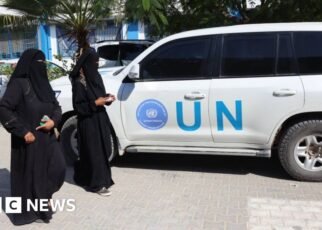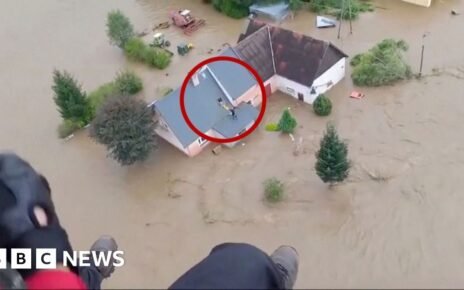[ad_1]
People in war-torn Gaza are already struggling with a deep humanitarian crisis – but now they fear it will get much more difficult because of Israel’s ban on the biggest UN agency which operates there.
“Unrwa means everything to us: it is our life, our food, our drink and our medical care. When it closes, there will be no flour. If my son gets sick, where will I go?” asks Yasmine el-Ashry in Khan Younis.
“Banning Unrwa is another war for the Palestinian people,” said registered refugee Saeed Awida.
“They want to exterminate the Palestinian people and not provide us with humanitarian services.”
Despite international opposition, in Israel’s parliament there was wide support for the new legislation, which will prevent Israeli officials being in contact with Unrwa – the UN’s relief and works agency for Palestinian refugees in the Near East.
The agency is accused of being complicit with Hamas.
“A terrorist organisation has completely taken over it,” claims Sharren Haskel from the opposition National Unity Party – a co-sponsor of the bill.
“If the United Nations is not willing to clean this organisation from terrorism, from Hamas activists, then we have to take measures to make sure they cannot harm our people ever again.”
Unrwa insists on its own neutrality.
It says that if the new Israeli laws against it are implemented as planned in three-months’ time, the effect will be profound, particularly in the occupied Palestinian territories.
“It would essentially make it impossible for us to operate in Gaza,” Sam Rose, Unrwa’s Gaza deputy director, has said.
“We wouldn’t be able to bring in supplies, because that has to take place in co-ordination with Israeli officials. It wouldn’t further be able for us to manage our movements safely in and out of Gaza around checkpoints, but just in and around conflict zones.”
He points out that the protected status of Unrwa schools, clinics and other buildings where hundreds of thousands of displaced people have been sheltering would effectively be lost.
Israeli media suggest that there were warnings from diplomats and the security establishment about the consequences of taking action against Unrwa.
Israel stands accused of being in breach of the UN charter and its obligations under international humanitarian law.
However, ultimately domestic politics outweighed these considerations
Unrwa was set up in 1949 by the UN General Assembly in the wake of the first Arab-Israeli war which followed the creation of the state of Israel.
It helped some 700,000 Palestinians who had fled or been forced from their homes.
Seven decades on, with the descendants of those original refugees registered, the number of Palestinians supported by Unrwa has grown to six million across Gaza, the West Bank (including East Jerusalem), Lebanon, Jordan and Syria.
It helps them with aid, assistance, education and health services.
The agency has long been a lightning rod for Israeli criticism, for example with allegations that the textbooks used in its schools promote hatred of Israel.
However, this has grown dramatically since Hamas’s 7 October attack last year.
Last week, Unrwa confirmed that a Hamas commander killed in an Israeli strike had been an employee since 2022.
He was apparently filmed leading the killing and kidnapping of Israelis from a bomb shelter near Kibbutz Re’im.
The UN launched an investigation after Israel charged that 12 Unrwa staff took part in the Hamas-led assault on southern Israel; seven more cases later came to light.
In August, Unrwa said that nine staff members out of the thousands it employs in Gaza may have been involved in the attacks and had been fired.
“We have taken immediate and strong and direct action against any allegations that we have received,” maintains Sam Rose.
Israel has long complained that the existence of Unrwa perpetuates the problem of Palestinian refugees – a core issue in the Israel-Palestinian conflict.
UN officials counter that this can only be solved as part of a negotiated political settlement.
But in Gaza, where most of the 2.3 million population are registered refugees, the new actions against Unrwa are also seen as a troubling attack on their status.
“I am telling you that the word “refugee” will disappear. They do not want the word refugee. Israel is looking for this,” Mohammed Salman from Deir al-Balah told the BBC.
[ad_2]
Source link



